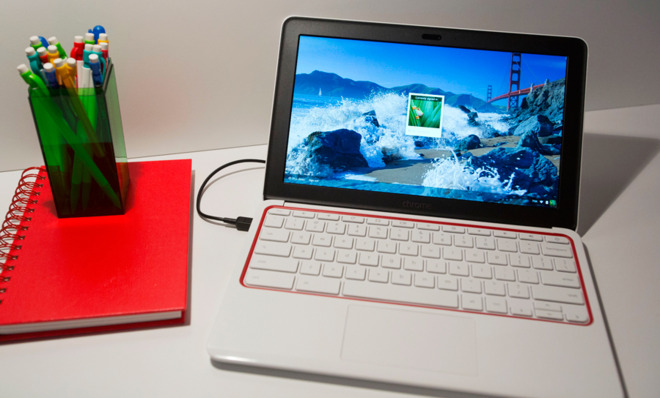The Google Chromebook 11 review
Functional? Sure. Fun? Not really.

A free daily email with the biggest news stories of the day – and the best features from TheWeek.com
You are now subscribed
Your newsletter sign-up was successful
Netbooks have been a failure. PC sales are in a perpetual Gravity-style free fall. And tablets have planted their flag as the de facto internet-connected gadget for many households.
Enter the browser-only Chromebook, which is trying to carve out a niche for itself in an increasingly saturated market.
I've been playing around with the latest model, HP's Chromebook 11 ($280, WiFi-only), for the past week or so, using it to compose posts and browse the internet. (Disclosure: Google gave them away at a press event last week. And I already own the Cr-28 Chromebook prototype from 2010, which I really liked.)
The Week
Escape your echo chamber. Get the facts behind the news, plus analysis from multiple perspectives.

Sign up for The Week's Free Newsletters
From our morning news briefing to a weekly Good News Newsletter, get the best of The Week delivered directly to your inbox.
From our morning news briefing to a weekly Good News Newsletter, get the best of The Week delivered directly to your inbox.
The premise of the Chromebook is simple enough. For under $300, you'll get a fancy schmancy web-browsing machine. The trade-off is you can't run traditional desktop apps: No Photoshop, no iTunes, no Final Cut, etc.
The web, though, has reached the point where you can actually accomplish quite a lot using just a browser — even offline — thanks to the Chrome Web Store. Very basic photo editing? Use Pixlr. Want to write a note? Write Space is basically Text Edit in a tab. Play music? Rdio, Spotify, and SoundCloud cover most tastes. Movies? Netflix, Hulu, Amazon Instant Video, and the list goes on. In a sense, Chromebooks are better for creating and making things than their tablet competition.
That said, if you play games, edit video, compose music, or do anything much more complicated than checking Gmail or falling asleep to Netflix, Chromebooks probably aren't for you.
One thing I really liked about the Chromebook 11 is how nicely it plays with Chromecast, Google's $35 TV dongle that lets you watch online media on a television screen. After cueing up something on Netflix and hitting the Chromecast button in the corner, it was very easy to switch to a different tab while watching Bob's Burgers, and do some online shopping with the Netflix stream still playing on the TV.
A free daily email with the biggest news stories of the day – and the best features from TheWeek.com
Also nice: The Chromebook 11 uses a miniUSB to charge, which, unlike Apple's proprietary chargers, makes it very easy power up when you're out and about.
From a tactile standpoint the slightly compressed keyboard isn't difficult to adapt to, although I find the keys inconsistently springy.
And, while this may be purely a personal preference, the 11.6-inch screen nails a sweet spot in terms of daily portability. It's light but sturdy, too, at just a shade over two pounds.
There are downsides, and they're frustrating enough to take away from the overall experience. The Chromebook 11's trackpad is my biggest gripe: It is very cheap-feeling and finicky, which makes nailing small links or copying-and-pasting sentences trickier than they need to be. Luckily, the Chromebook 11 comes with two USB ports for you to add a mouse.
Battery life is also a letdown. Google promises six hours in between charges, but in reality it's closer to five with consistent use. That in itself isn't completely terrible, but compared to today's tablets (the Nexus 7 gets close to 10, the iPad Mini nearly 13), it's pretty dismal. I can throw a tablet in a backpack, forget about it for a day or two, and still boot it up. The same can't be said for the Chromebook 11, which was always dead if I forgot about it for a day.
Other minor gripes include the poor front-facing camera for video-calling, which is borderline unusable in a dim bedroom. And the model I tested, a glossy all-black machine, was prone to fingerprint smudges.
It's also hard to justify the extra $30 over last year's Samsung Chromebook ($248, WiFi-only) or even the newly announced mouthful that is the C720-800 from Acer ($250). Ostensibly you get a bit of extra processing juice (a 1.7 GHz dual-core processor), but the advantage may be moot for most people, unless you plan on running a Google Hangout while Chromecasting while playing three versions of Angry Birds in three separate tabs.
I like the Chromebook 11, but on the whole it's a rather disappointing iteration. If you need a backup machine to keep around on the coffee table it's a solid purchase, but quite honestly you're probably better off with something like a Nexus tablet. For bloggers, it's a nice and portable coffee shop computer once you master the Chrome-only learning curve.
Is it functional? Sure. Fun? Not really. It's not quite as puzzling as the fully loaded but very expensive Chromebook Pixel, but it's also not the best Chromebook you can get for your money. Which speaks volumes, really.
Other reviews: The Verge, Ars Technica, Computerworld
-
 The Olympic timekeepers keeping the Games on track
The Olympic timekeepers keeping the Games on trackUnder the Radar Swiss watchmaking giant Omega has been at the finish line of every Olympic Games for nearly 100 years
-
 Will increasing tensions with Iran boil over into war?
Will increasing tensions with Iran boil over into war?Today’s Big Question President Donald Trump has recently been threatening the country
-
 Corruption: The spy sheikh and the president
Corruption: The spy sheikh and the presidentFeature Trump is at the center of another scandal
